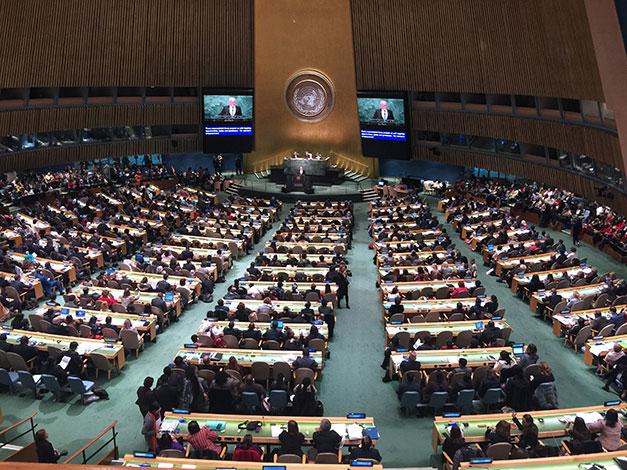CSW61 Opening Session
CSW61 Opening Session
JEANNE CARROLL
MARCH 13-24, 2017 - UN, NEW YORK
Inside the kick-off of CSW's 61st Session
The 61st session of the Commission on the Status of Women (CSW61) was held in New York City March 13 through March 24. Over 9,000 women registered worldwide to attend UN Women's yearly event. Each year the CSW maintains three themes. This year the Priority Theme was "Women's economic empowerment in the changing world of work." The agreed conclusions of the fifty-eighth session were the basis of the Review Theme, "Challenges and achievements in the implementation of the Millennium Development Goals for women and girls." The Emerging Focus area for CSW62 is the empowerment of indigenous women. While Member States sponsored numerous events within the UN proper, NGOs representing civil society worldwide held over 350 events throughout the city.
The opening session was chaired by H.E. Mr. Antonio de Aguiar Patriota, Representative of Brazil to the UN. He warmly welcomed all in attendance and continued on to support gender equality and encouraged women worldwide to keep women's issues at the forefront of their nation's attention.
It was a pleasure to be greeted by the newly elected Secretary-General, António Guterres, who stated his unwavering support of women worldwide. He stressed three points: gratitude for all those working for women's equality; the empowerment of women as a vital key in the male-dominated world community; and that the United Nations, and himself personally, stand up for women's empowerment. SG Guterres ended his remarks by imploring the audience saying, "We need you more than ever before."
The highlight of the opening session was an address by the Honorable Phumzile Mlambo-Ngcuka, Executive Director of UN Women and Under-Secretary-General of the UN, in which she called for swift and decisive action for increased representation of women in all decision-making levels and to make the voice of women a major drive for change. She urged all to "agree to constructive impatience" in tackling the biases against women in all sectors. Her statement, "If you are a woman, you are a worker, period" drew a lively reaction.
Ms. Mlambo-Ngcuka highlighted the burden all women bear for unpaid labor, primarily for child and elder care, as well as for various domestic responsibilities. She encouraged world leaders to introduce practices to address the global pay gap and stressed that technology-enabled solutions for women cannot fully be taken advantage of with 200 million fewer women online than men.
In closing, she stressed that much work still needs to be done to eliminate violence against women, including sexual harassment at work, reproductive rights, paid parental leave, safe affordable child care services, product and service development, and women's leadership in collectives, unions, networks. She thanked civic society for its effort to educate women and girls to the possibilities of a gender-balanced world.
This year's opening session focused on hope and substantial progress for women. Over the two weeks, member states with the support of several world caucuses, made up of civil society, gathered and voted on agreed-upon conclusions that governments could take into consideration when formulating future policies. More details on these conclusions can be found at unwomen.org under the title "CSW61."

